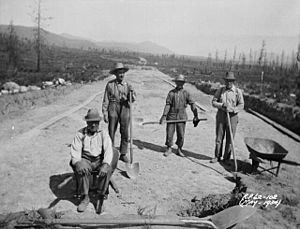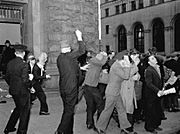Relief Camp Workers' Union facts for kids
The Relief Camp Workers' Union (RCWU) was a special group formed by workers in Canada during the Great Depression. This was a tough time in the 1930s when many people didn't have jobs or enough money. The RCWU was created by the Workers' Unity League and was connected to the Communist Party of Canada.
The union started because of the difficult conditions in the government work camps. Men in these camps worked hard but were paid very little. The RCWU is famous for helping to plan the On-to-Ottawa Trek. This was a big protest march during the Great Depression to demand better conditions.
Contents
Canada's Tough Times and Work Camps
The Great Depression Hits Canada
The Great Depression in Canada was a period of big economic problems. It lasted for about ten years, from 1929 to 1939. During this time, many people struggled to find food and work. Their quality of life went down a lot.
By 1933, Canada's economy was in big trouble. It was hard to sell things like wheat and other goods to other countries. This caused a near-complete economic collapse.
At first, local governments were supposed to help people who lost their jobs. But there were so many unemployed people that cities and towns quickly ran out of money. For example, the Ontario government tried to create public works jobs. But unemployment kept growing. In British Columbia, many people lost their jobs because the province relied on selling raw materials. By 1933, 30% of people in BC were unemployed.
In the prairies, years of dry weather and bad harvests made things even worse. Many families had to leave their homes and move west to find work. Vancouver became a popular place for these workers. It had a special department to help people, and the weather was milder.
Help for Single Men
Before the government set up special camps, it was very hard for single men to get help. At that time, people often thought men should always have a job and be strong and independent. They believed single men should take care of themselves.
For example, in Guelph, Ontario, men with families got two days of work a week. But single men only got two days of work every two weeks. As the Depression got worse, single men might only get work two days every three weeks. They were often paid with a little cash and special vouchers for food.
Because of these ideas, many single men traveled across Canada looking for work. This caused problems, and the federal government had to step in.
Government Work Camps
The Canadian government was worried about the growing number of unemployed men. They feared these men might become interested in communism. In 1931, the government even made the Communist Party of Canada illegal.
To deal with the problem, Major-General Andrew McNaughton suggested creating relief camps. These camps would give single men work, food, clothes, and medical care. The idea was to keep them busy and reduce unrest.
The first federal relief camps opened in October 1932. They were often set up near existing military bases to save money. The military also helped run them. Each camp had "projects" like building roads or forestry work. Camps were often in isolated areas, away from cities. This was to keep workers away from people who might encourage protests.
These camps did help ease some tensions at the start of the Depression.
How the Union Started in the Camps
Life in the Camps
The government wanted to run the camps as cheaply as possible. They promised food, clothing, medical care, and some money. But the quality of these things was often poor.
The biggest problem was the money. Men were paid only twenty cents for each day they worked. There was a lot of debate about whether this was a real wage or just an allowance. Sometimes, money was even held back from the workers.
Why Workers Were Unhappy
Workers had many complaints about the camps. The food was bad, there weren't enough bathrooms or showers, and the pay was very low.
People outside the camps, like other unions, also complained. They said the cheap labor in the camps meant less work for regular union members. Workers inside the camps felt their work was important. They were building roads and other important things. They believed they should be paid a fair wage.
The government tried to keep the men from organizing together. But it didn't work. The workers formed the RCWU. The union demanded forty cents an hour and a five-day work week. They called the camps "slave camps" because of the low pay. More and more workers joined the RCWU.
If a worker was caught organizing or joining the union, they could be kicked out of the camp. So, RCWU organizers had to work secretly.
Camp Strikes and Protests
The RCWU organized its first strike in December 1934. In the four years the camps were open, there were hundreds of strikes and protests. The Workers' Unity League, which helped start the RCWU, sent people to the camps to spread ideas and encourage workers to join.
Many strikes happened in British Columbia. Hundreds of camp workers went to Vancouver to protest the camp conditions. These strikes were usually short. The workers would return to the camps after being promised that their complaints would be looked into.
In other parts of Canada, like Ontario, there were fewer protests. This was because there were fewer men in those camps.
By May 1935, the RCWU was running out of money and resources. But they still had many unhappy members. In June 1935, these men started a long journey called the On-to-Ottawa Trek. They rode on top of freight trains, heading east to speak with Prime Minister Bennett in Ottawa. However, they were stopped in Regina.
RCWU Protests in Cities
While in Vancouver, the RCWU members protested often to make the public aware of their issues. They tried to keep their protests peaceful so people would support them.
One time, on April 26, a group of protesters marched into a Hudson's Bay Company department store. Other stores usually had guards and closed their doors. But this one was unguarded. The store manager called the police. A fight broke out, and some display cases were broken. A police officer was hurt.
Later, the protesters gathered at Victory Square. The mayor, McGeer, came and read a special order to make the crowd leave.
Another time, RCWU strikers took over the city museum for eight hours. They only left after the city promised them money to buy food for three days.
The city, provincial, and federal governments all disagreed on who was responsible for helping the unemployed. This made people support the strikers even more.
The police and special officers were ready for trouble. The government thought the Communists were trying to start a big strike in Vancouver. There was also a strike happening with longshoremen (dock workers) who were also led by the WUL. The government feared these two groups might join forces.
However, the relief camp strikers decided they had done all they could in Vancouver. They voted to take their demands directly to Ottawa. This led to the famous On-to-Ottawa Trek.
After the Trek
The On-to-Ottawa Trek ended in Regina. Most of the men went back to the camps. But their actions helped lead to important changes later on. Many historians say this event was a key moment that helped create Canada's welfare state after the war.
In 1935, many RCWU members who were Communists left to fight against fascism in the Spanish Civil War.
The issue of relief camps came up again in Vancouver in 1938. The RCWU's new group, the Relief Project Workers' Union, organized another protest. On May 20, 1938, protesters took over several buildings, including the post office. Over a thousand men stayed in the post office for almost a month. On June 18, the Royal Canadian Mounted Police violently removed them. This day became known as "Bloody Sunday." Many people were hurt, and 28 men were put in jail. Protesters demanded the release of the prisoners and the resignation of Premier Patullo.
Leaders
Some of the important leaders of the RCWU were:
- Arthur "Slim" Evans
- Ernest (Smokey) Cumber
- Matt Shaw
- Malcolm MacLeod
- Ronald Liversedge
- James "Red" Walsh
- Perry Hilton
- Lionel Edwards
- Steve Brody
- Bob "Doc" Savage
- Mike McCauley
- Bill Davis
- Gerry Winters
- Jack Cosgrove
- Steward "Paddy" O'Neil
 | Isaac Myers |
 | D. Hamilton Jackson |
 | A. Philip Randolph |



